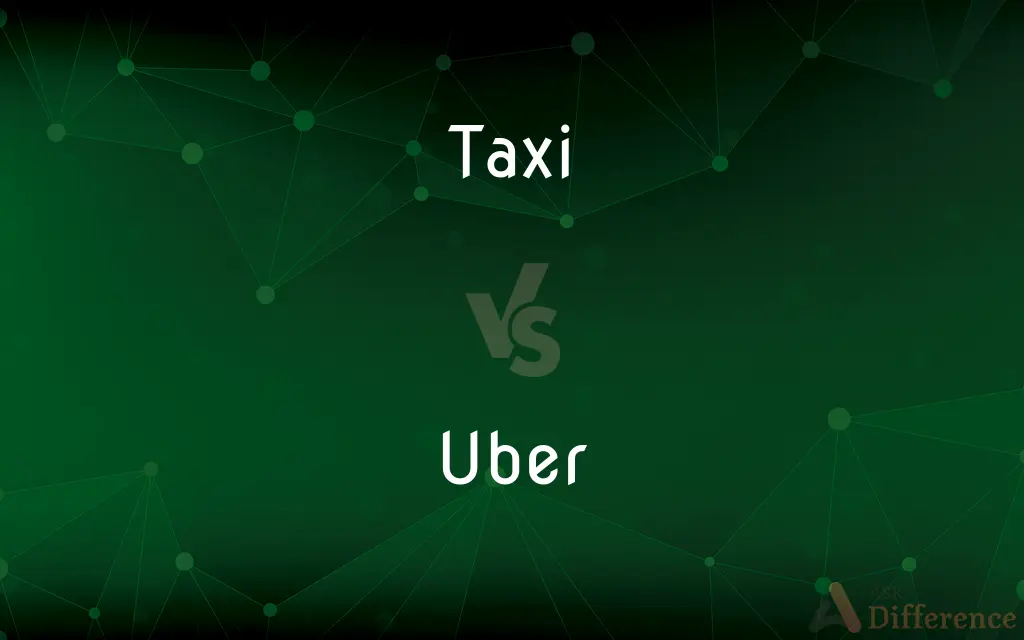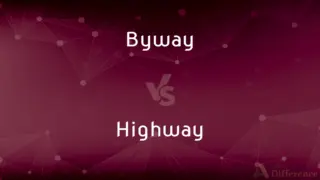Taxi vs. Uber — What's the Difference?
Edited by Tayyaba Rehman — By Fiza Rafique — Updated on April 1, 2024
A taxi is a licensed vehicle for hire with a driver, offering rides for a fare determined by a meter, while Uber is a ride-sharing service that connects passengers with drivers through a mobile app, with fares calculated upfront.

Difference Between Taxi and Uber
Table of Contents
ADVERTISEMENT
Key Differences
Taxis are part of a traditional public transportation system, often regulated by local governments, which dictates fares, operating areas, and licensing. Uber, a representative of the gig economy, uses technology to offer a flexible and user-friendly alternative, allowing drivers to use their personal vehicles for transporting passengers.
Taxis can be hailed on the street in many cities or booked via phone or taxi stands, offering a sense of immediacy and accessibility without the need for a smartphone or internet access. Uber, however, requires passengers to book rides exclusively through its app, providing convenience, ride details, and the option to choose from different levels of service.
Fare calculation is a key difference: taxi fares are typically meter-based, considering distance and time, potentially leading to variability due to traffic conditions. Uber fares are calculated upfront, considering factors like demand, distance, and time, but can be subject to surge pricing during high demand periods.
In terms of payment, taxis traditionally accept cash and sometimes credit cards, depending on the city. Uber transactions are cashless, processed entirely through the app, offering a seamless payment experience but requiring a credit card or other digital payment method.
Comparison Chart
Booking Method
Street hail, phone, taxi stands
Mobile app
ADVERTISEMENT
Fare Calculation
Meter-based (distance, time)
Upfront with surge pricing options
Regulation
Local government-regulated
Less regulated, varies by location
Vehicle Ownership
Licensed, commercial vehicles
Drivers’ personal vehicles
Payment Method
Cash, sometimes credit cards
Cashless, through the app
Compare with Definitions
Taxi
Accepts various forms of payment.
After reaching the destination, he paid the taxi driver in cash.
Uber
Offers upfront fare calculation and various service levels.
He chose UberX for an affordable ride option.
Taxi
Traditionally doesn’t require internet access for booking.
They booked a taxi by calling the service directly.
Uber
A ride-sharing service booked through a mobile app.
She ordered an Uber for a quick trip to the cafe.
Taxi
Can be hailed on the street or booked in advance.
Taxis in the city can be easily hailed downtown.
Uber
Processes payments digitally, no cash required.
The fare was automatically charged to her credit card via the app.
Taxi
A regulated form of transportation with metered fares.
She caught a taxi from the airport, paying by the meter.
Uber
Uses personal vehicles, less regulated than taxis.
Her Uber driver used a clean and comfortable personal car.
Taxi
Operates within regulatory frameworks.
Taxi drivers are licensed and operate under city regulations.
Uber
Requires internet access and app use for booking.
They booked their Uber ride using the smartphone app.
Taxi
A motor vehicle licensed to transport passengers in return for payment of a fare and typically fitted with a taximeter
I'll take a taxi from the air terminal
A taxi driver wanted five dollars to drive me to my hotel
Uber
Uber Technologies, Inc., commonly known as Uber, is an American technology company. Its services include ride-hailing, food delivery (Uber Eats), package delivery, couriers, freight transportation, and, through a partnership with Lime, electric bicycle and motorized scooter rental.
Taxi
(of an aircraft) move slowly along the ground before take-off or after landing
The plane taxied to a halt at the terminal
Uber
Super; high-level; high-ranking
Taxi
Take a taxi as a means of transport
I would taxi home and sleep till eight
Uber
Very; super
Taxi
A taxicab.
Taxi
To be transported by taxi.
Taxi
To move slowly on the ground or on the surface of the water before takeoff or after landing
An airplane taxiing down the runway.
Taxi
To transport by or as if by taxi
Taxied the children to dance class.
Taxi documents to a law office.
Taxi
To cause (an aircraft) to taxi.
Taxi
A vehicle that may be hired for single journeys by members of the public, driven by a taxi driver.
Taxi
(aviation) The movement of an aircraft across an airport's surface under its own power; a phase of aircraft operation involving this movement.
During taxi, the flaps and slats are extended and the second engine (if not already running) is started.
Seat belts must be kept fastened during taxi, takeoff, turbulence, and landing.
Taxi
(South Africa) A share taxi.
Taxi
To move an aircraft on the ground under its own power.
Taxi down the runway
Taxi
To travel by taxicab.
Taxi
Same as taxicab.
Taxi
Any vehicle that carries passengers for a fare, as a water taxi.
Taxi
A car driven by a person whose job is to take passengers where they want to go in exchange for money
Taxi
Travel slowly;
The plane taxied down the runway
Taxi
Ride in a taxicab
Common Curiosities
Is Uber available in all cities where taxis operate?
No, Uber’s availability depends on local regulations and the company’s operations, which may not cover all areas where taxis operate.
How do drivers for Uber differ from taxi drivers?
Uber drivers use their personal vehicles and operate on a more flexible schedule, while taxi drivers typically use licensed, commercial vehicles.
How do you pay for a taxi ride?
Taxi rides can be paid with cash or, in some cases, credit cards, depending on the taxi and city regulations.
What is surge pricing with Uber?
Surge pricing occurs when there’s high demand for rides, increasing the fare price to balance demand and available drivers.
Are taxi fares more expensive than Uber?
It depends on various factors, including location, time, and demand. Taxis have regulated fares, while Uber prices can fluctuate with demand.
What happens if there’s heavy traffic when using Uber?
The fare for Uber is calculated upfront and typically won’t change due to traffic, unlike taxis where the fare can increase with time spent in traffic.
Can you choose the type of vehicle with a taxi service?
Generally, no. Taxi services usually assign the next available vehicle, unlike Uber, where you can choose from different types of services.
Can I cancel an Uber ride?
Yes, you can cancel an Uber ride through the app, but there may be a cancellation fee depending on how much time has passed since you booked the ride.
Can you book an Uber without a smartphone?
No, booking an Uber requires a smartphone and the Uber app.
What safety features does Uber offer?
Uber provides features like driver profiles, real-time GPS tracking, and the ability to share trip details with friends or family for added safety.
Are taxis safer than Uber?
Safety can vary and depends on various factors including the vehicle condition, driver vetting processes, and local regulations.
What’s the main difference between a taxi and Uber?
The main difference is the booking method and fare calculation, with taxis often hailed and paid by meter, while Uber is app-based with upfront pricing.
Do taxi drivers undergo background checks?
Yes, most jurisdictions require taxi drivers to pass background checks and hold a taxi driver’s license.
How has Uber affected the taxi industry?
Uber and similar services have significantly disrupted the traditional taxi industry, offering more flexible and often cheaper alternatives, leading to increased competition and regulatory debates.
Why might someone choose a taxi over Uber?
Preference for taxis might be due to immediate availability, no need for an app or digital payment, or familiarity with the service.
Share Your Discovery

Previous Comparison
Bali vs. Fiji
Next Comparison
Byway vs. HighwayAuthor Spotlight
Written by
Fiza RafiqueFiza Rafique is a skilled content writer at AskDifference.com, where she meticulously refines and enhances written pieces. Drawing from her vast editorial expertise, Fiza ensures clarity, accuracy, and precision in every article. Passionate about language, she continually seeks to elevate the quality of content for readers worldwide.
Edited by
Tayyaba RehmanTayyaba Rehman is a distinguished writer, currently serving as a primary contributor to askdifference.com. As a researcher in semantics and etymology, Tayyaba's passion for the complexity of languages and their distinctions has found a perfect home on the platform. Tayyaba delves into the intricacies of language, distinguishing between commonly confused words and phrases, thereby providing clarity for readers worldwide.
















































